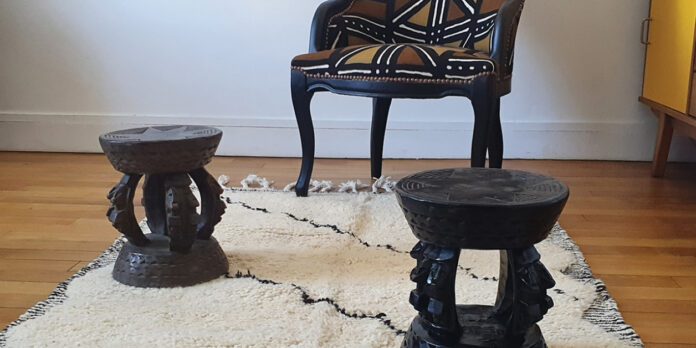Bogolan blankets, thong pillows, lepi fabrics from Guinea, basketry and traditional ceramics, figurines, masks... Here are some of the accessories signed by Maison Laadani (home of traditions in the Soninké language), which can be found around the corner from the imposing Hotel 25 hours erected in front of Gare du Nord, in Paris.
Alongside these well-made decorative elements, but not surprisingly, come some complete pieces that Habi Diabira, creator of the brand, finds throughout West Africa. Among the nuggets, benches or even majestic wooden Dogon doors inlaid with patterns work by hand, which a French woman, daughter of Malian parents, collects in antique shops.
Promote knowledge
For this former public health engineer, who worked in Mali, Senegal, Ivory Coast, Ghana and even South Africa, traceability is important. “These doors come from attics or huts that mainly serve as pantries in this kingdom excavated in the cliffs. Some of them date back to 1910-1912”, he guarantees. Concern about expenses, restoration and preservation work, transport to France, all criteria that justify the prices of the pieces, which can sometimes reach 2,000 euros depending on the size.
African furniture and decorative objects are today diverted from their main function, but I like to record their history
“I’m not into a fast-deco model. Offering quality crafts takes time. This is one of the aspects that can discourage other players in the market”, observes the 36-year-old businessman who works directly with local artisans, or via cooperatives. Another point on which a designer does not compromise is the remuneration of his employees at a fair price so that they continue to make a living from their activity.
The designer, who started on the Etsy platform in 2020, is now proud to have in between its clientele of tourists from all walks of life, from Asia to Iceland, since the launch of the physical showroom. The way she conveys the story of her collection to buyers, an audience of connoisseurs and neophytes. “African furniture and decorative objects are today diverted from their primary function, but I like to note that they are, originally, everyday tools, important objects or objects intended for rites and that they have a sacred function. »
This is the case of Cameroon's “juju hats” or also known as hats, so called in reference to the parrot bird found in Bamiléké villages, traditionally used during princely ceremonies, enthronement, birth or funerals that Maison Laadani, such as other brands of contemporary African products, furniture, offers as wall decoration. “This colorful headdress made of chicken feathers and raffia was introduced by the Cameroonians to the South Africans, who in recent years brought it into an interior decoration element,” she explains. By presenting some of the treasures that the continent holds, Habi Diabara contributes to the preservation of a know-how that tends to be lost.
Maison Laadani at 25hours Hotel until March 6
12, Boulevard de Denain, 75010 Paris
etsy.me/3sLUsg0

